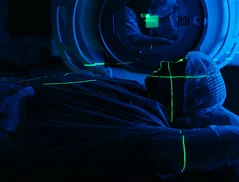


restorative medicine
Leading the Next Era of Dementia Research
Houston Methodist is pioneering new frontiers in dementia research, from molecular discovery to regenerative medicine and real-time brain imaging.
Read now

Popular Features

precision medicine
Advances in Glioblastoma Research
Houston Methodist researchers are testing drugs developed by Texas A&M University colleagues to treat glioblastomas—the most deadly and aggressive primary brain malignancy.
Read now

Amplifying the Invisible: Unlocking Genomes That Matter
Rodrigo de Paula Baptista, PhD, and his team are using multiple displacement amplification (MDA) with Nanopore sequencing to unlock high-quality genomes from tiny or degraded samples.
Read now


outcomes research
Focus
Innovative Education
Community Health Worker Program Expands Cancer Preventative Services Reach
As part of its long-standing partnership with Legacy Community Health, Houston Methodist is now home to C-CUR, a community health worker-led program that provides vulnerable populations assistance in cancer screening and care.
Read now
Clinical Research
The Renaissance Researcher
Henry Pownall, PhD, was recently elected as a Fellow of the American Association for the Advancement of Science, but this researcher is a Renaissance man who writes books on poetry and language.
Read now
Outcomes Research
Gut Microbiota as a Therapeutic Target
Houston Methodist researchers are modulating the gut microbiome dysbiosis to reduce neuroinflammation and find therapeutic solutions for neurodegenerative diseases.
Read now
Restorative Medicine
When Art and Science Meet: Microvascular Reconstruction
Laura Minhui Kim, MD, MSc, is more than a Head and Neck Oncology and Reconstructive Surgeon–she’s an artist. In a recent case of angiosarcoma, a rare but severe skin cancer, she performed microvascular reconstruction on a patient’s scalp to restore function and cosmesis. Learn more about the patient’s journey and the artistry behind healing.
Read now
Precision Medicine
Tiny Cell Messengers in Obese Individuals Accelerate Alzheimer’s-linked Plaque Buildup in the Brain
A first-of-its-kind study from Houston Methodist found that adipose-derived extracellular vesicles—tiny cell-to-cell messengers in the body—can signal the buildup plaques that are a key feature of Alzheimer’s disease.
Read now



